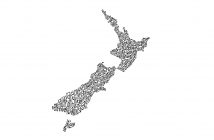The Local Government Commission’s proposal for a single Wairarapa District Council is welcome but a more comprehensive approach is needed, says Infrastructure New Zealand Chief Executive Stephen Selwood.
says Infrastructure New Zealand Chief Executive Stephen Selwood.
“It is positive to see the Local Government Commission has put forward a sound proposal for the Wairarapa, but the ongoing piecemeal approach to reform is not tackling the wider national issue of whether councils can plan, fund and meet long-term local needs,” he maintains.
The commission has proposed that the existing Masterton, Carterton and South Wairarapa district councils be brought together into a single Wairarapa District Council.
The new entity will have a single mayor, elected at large, and 12 councillors elected across seven wards.
Wairarapa will have the choice of either accepting or rejecting the Commission’s proposal, likely in a poll next year.
“The commission’s proposal will deliver a more capable and better resourced council for the area,” Selwood believes.
“The larger entity will have improved capacity for strategic planning, a bigger balance sheet to support investment prioritisation and will be able to speak with a louder, united voice on behalf of all of Wairarapa.
“We agree with the commission that these benefits can be realised whilst maintaining local representation and identity through community boards.
“In our view, community boards should be delegated with appropriate powers and funding at the local level to support community needs.”
This proposal is definitely “a step forward” for Wairarapa, Selwood admits.
“But it is still not clear whether the new 40,000 resident entity will be sufficient to meet long term challenges.
Nor is it clear what the solution is for New Zealand’s 64 other territorial authorities, most of whom find themselves facing exactly the same issues as the Wairarapa.
“Population aging across virtually all of New Zealand is constraining the ability of councils to increase rates at the same time as billions of dollars of infrastructure comes up for renewal.
“Together with increased expectations for environmental performance, greater health and safety requirements, stronger heritage protections and other directives from central government, growth councils are responding by underfunding new development and impeding housing supply.
“The whole system by which councils are funded, the responsibilities they have and the decisions they are required to make is unsustainable and needs to be revised.
“Meeting long-term challenges requires governance structures which allow effective planning supported by resources and delivery capability.
“This is as true for councils in the South Island as it is in the Wairarapa and rest of the North Island.
“What is required is a first-principles review of local government’s role in New Zealand, how councils are resourced and what the optimum structures are for meeting 21st century needs,” Selwood argues.




